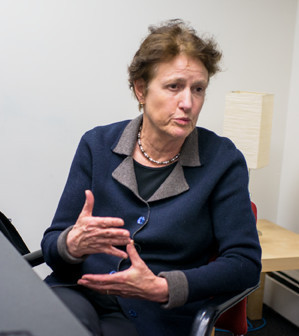Frances Beinecke reflects on fight for environment
Sigourney Weaver has told a variety of media outlets that when seeking inspiration to play one of her tough characters, like Grace in “Avatar” or Ripley in the “Alien” series, she thinks of her high school friend Frances Beinecke, who recently stepped down as president of the Natural Resources Defense Council (NRDC).
The longtime Riverdale resident is modest about the high-profile praise. Asked whether, à la Ripley, she shows no mercy to the enemies of conservation, she said, “I hope so.”
“It was a great compliment to me, although I think it’s a little exaggerated,” Ms. Beinecke, 65, said of the remarks from Ms. Weaver, who most recently reiterated them in an October piece she wrote about Ms. Beinecke for Vanity Fair.
Still, during an interview on Monday, the activist’s first official day of retirement from her 40-year career with NRDC, Ms. Beinecke showed a dedication to environmentalism that brought Ms. Weaver’s praise into focus.
“One thing I’ll say after many years in this field is nothing is protected without a lot of vigilance,” she stated. “When you think you win something, nothing is ever permanently won.”
As an example of that principle, Ms. Beinecke cited the fight against LG Electronics USA’s plans to build a new headquarters on the Palisades. NRDC has joined a lawsuit challenging a zoning variance that would allow LG to build an eight-story building in the middle of the landmarked cliffs across the Hudson River and across from Manhattan’s Cloisters.
The Palisades have “a whole lot of designations, and yet none of those designations would have prevented the building from being built once the town passed the variance. So you just can’t assume that things are going to stay as they are without citizen action.”
“That’s what the environmental movement is about,” she continued. “It’s about taking action and having a voice.”
International activist
During her career at NRDC, which included nine years as president, Ms. Beinecke raised her voice at locations from Beijing to the Gulf Coast.
She helped the organization establish its first office in China, one of the most important countries in the world for climate change activists, and was one of seven people on the president’s National Commission on the BP Deepwater Horizon Oil Spill and Offshore Drilling following the 2010 disaster off the Gulf Coast.
The Beijing office opened in 2007. Ms. Beinecke said at first, Chinese officials would ask what other countries were doing about pollution when discussing climate change. But she said she has since seen unrest over China’s notoriously poor air quality prompt leaders to embrace clean energy sources.
“We’re really different and so I think that there are ways that we can actually learn from one another,” she remarked.
She said the U.S. is the only country in the world where a large group of policymakers denies the existence of climate change. She added that is why Congress did not adopt any of the recommendations from the presidential panel created after the Deepwater Horizon Spill.
“The area is just as liable to have that accident as it was five years ago. That’s because the industry basically has tremendous power, and our culture now is less government, less government, less government. And the Interior Department doesn’t have the wherewithal to provide the kind of oversight that’s required.”
Clean-energy future
Aside from contributing to undertakings like the committee, Ms. Beinecke explained that much of her organization’s work involves implementing and enforcing federal statutes. She said highlights of her time at NRDC include helping the Clean Air Act, which regulates emissions, through a series of legal hurdles since its passage in 1970.
“There’s just a constant back and forth between the industry and the environmental community about how to interpret these things,” she said. “Over time, we have won legal victory after legal victory.”
Ms. Beinecke said despite entrenched opposition from the fossil fuel industry, she is confident that factors like air quality and communities’ growing concerns about fracking will compel policymakers to invest in a clean-energy future.
Her idealism could be traced back to her undergraduate days at Yale University, where she and Ms. Weaver were roommates, and when America’s modern environmental movement was beginning in lockstep with anti-Vietnam War protests.
“As I developed my career and gained experience professionally, the movement blossomed and I sort of say that I grew up in parallel with the movement,” Ms. Beinecke said.
Her first role at NRDC, in 1973, was as intern.
The organization’s founder sang her praises at a dinner honoring her in December.
“Frances was born for this job. She’s a natural leader and she will guide NRDC into the future,” John Adams recalled saying in his recommendation for her to become president.
“Frances has helped this organization become stronger, more diverse and she’s taken NRDC’s climate and energy programs to new heights,” he added.
Ms. Beinecke said she is not yet sure of her next steps, but will remain an activist on climate change.
“That’s the issue of our time,” she said. “I don’t know exactly what platform I’ll use to do that, but I’m not at all worried about it because this is an issue where there are just so many ways to engage.”






